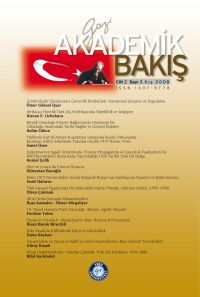Türklerin Kut’ül-Amare Kuşatması Sırasında İngiliz Ordusunda Bulunan Hintli Askerlerin Tutumu (Aralık 1915 - Nisan 1916)
The Attitude of the Indian Soldiers in the British Army during the Siege of Kut-al-amara (December 1915 - April 1916)
Author(s): İsmet ÜzenSubject(s): History
Published by: Gazi Akademik Bakış
Keywords: Kut-al-amara; The Indians; Hunger; Propaganda; Horse Flesh
Summary/Abstract: The siege of Kut-al-amara was the longest one that the English met throughout their history. The First English attempt to occupy Baghdad was interrupted in Ctesiphon by the Turks in Mesopotamian Campaign of the First War World. The 6th British Division, whose majority was Indians, tried to stand nearly 5 months against disease, hunger and the Turkish attacks from 7 December 1915 to 29 April 1916 when they were withdrew from Ctesiphon to Kut-al-amara. The restrictions for daily-food because of the Turkish siege and failures of the British Relief Force increased the danger of hunger. The Indian soldiers had to eat horse flesh because of rapid declining of foods but a long time they refused to eat horse flesh owing to their religious and traditional reasons. This also reduced both their physical and moral endurances against circumstances. In this period, the Indians were exposed to the Turkish propagandas but a few of them escaped to the Turkish side by the reasons of these propagandas and hunger. In the end, with the continuing failures of the British Relief Force and the coming to an end of foods, the British-Indian garrison in Kut-al-amara was forced to surrender to the Turks.
Journal: Gazi Akademik Bakış
- Issue Year: 2008
- Issue No: 03
- Page Range: 81-102
- Page Count: 22
- Language: Turkish

